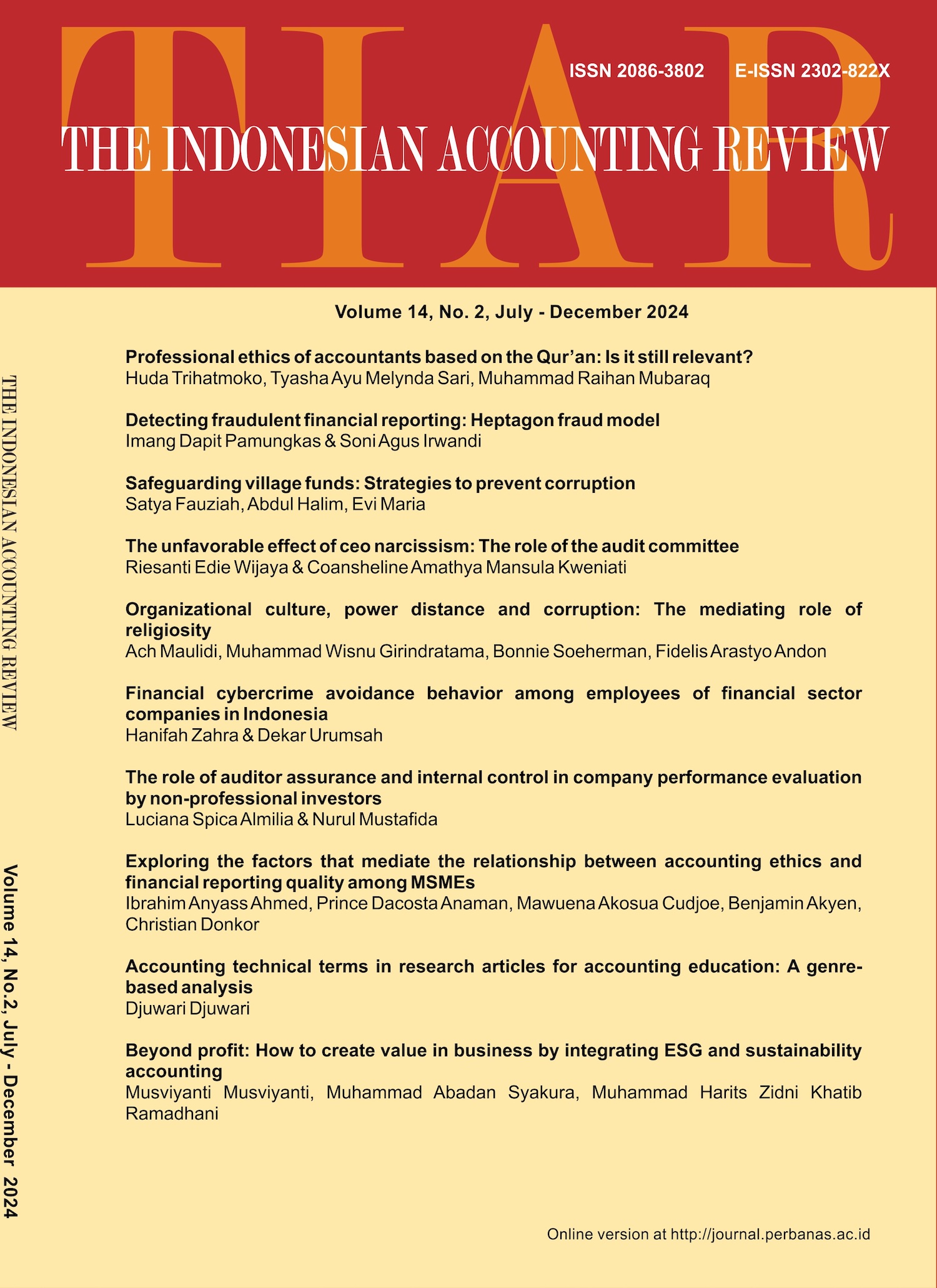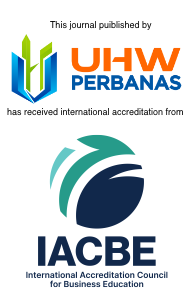Professional ethics of accountants based on the Qur’an: Is it still relevant?
DOI:
https://doi.org/10.14414/tiar.v14i2.4214Keywords:
Accounting profession, Code of ethics, Islamic ethicsAbstract
This study aims to contribute to the ethics of accountants in accordance with the values in the Qur’an. The accounting profession faces many ethical challenges, especially in terms of behavior. Ethical issues in business and professions, including accounting, continue to occur from time to time, both in Indonesia and in other countries. Indonesia, which is predominantly Muslim, is also not free from ethical violations in the accounting profession. This phenomenon raises discussions about how an accountant should behave. The research method used in this study is a literature review which is carried out by collecting, evaluating, and synthesizing various literatures relevant to the topic being studied. The analysis is carried out using an Islamic ethical theory approach based on the Qur’an and Hadith, where the findings from the literature are compared and evaluated based on Islamic ethical principles. The Indonesian Institute of Accountants (IAI) has formulated a code of ethics for the accounting profession which contains various rules regarding the behavior of accountants. All accountants must comply with the code of ethics. However, because the code of ethics does not have strict sanctions when a violation occurs, its application depends more on the personal awareness of the accountant. When someone who is pursuing a profession only relies on self-awareness, he must pay attention to his conscience. This study attempts to provide an offer on how the Qur’an uses conscience to regulate ethics that can be used in the Indonesian accounting profession.
References
A’yuni, I. K., & Wahyudi, A. (2024). Accounting Principles In Islam: Reflections on Surah Al-Baqarah Verse 282. Journal AL-WIJDÁN: Journal of Islamic Education Studies, 9(3), 307–319.
Ahsan, A. F. M. M., Bose, S., & Ali, M. J. (2024). Does Islamic Religiosity Influence Professional Accountants’ Judgments? Evidence from Global Convergence of IFRS. Advances in Accounting, 64, 1-14.
Aldousari, S. S., & Ickes, W. (2021). How is Machiavellianism Related to Locus of Control? A Meta-Analytic Review. Personality and Individual Differences Supports Open Access, 174.
Arens, Alvin, A., Elder, R. J., Beasly, M. S., & Yusuf, A. A. (2007). Jasa Audit dan Assurance: Pendekatan Terpadu. Auditing.
Armstrong, M. B. (1993). Ethics and Professionalism for CPAs. South-Western Pub.
Baidaei, M. (2000). Penerapan Kode Etik Profesi. Makalah Pada Kongres Luar Biasa Dan Konvensi Nasional Akuntansi (KNA) IV IAI.
Beekun, R. I., & Badawi, J. (1998). Leadership: An Islamic Perspective. Beltsville, MD: Amana Publications.
BPKRI. (2015). PP No. 20 Tahun 2015 tentang Praktik Akuntan Publik. https://peraturan.bpk.go.id/.
Brooks, L. J. (1989). Ethical Codes of Conduct: Deficient in Guidance for the Canadian Accounting Profession. Journal of Business Ethics, 8(5), 325–335. https://doi.org/10.1007/BF00381723.
Bungin, B. (2007). Penelitian Kualitatif: Komunikasi, Ekonomi, Kebijakan Publik, dan Ilmu Sosial Lainnya. Kencana.
Christensen, B. E., Glover, S. M., & Wood, D. A. (2013). Extreme Estimation Uncertainty and Audit Assurance. Current Issues in Auditing, 7(1), 36–42.
Chua, F. C., Perera, M. H. B., & Mathews, M. R. (1994). Integration of Ethic into Tertiary Accounting Programmes in New Zealand and Australia. Intertional Association for Accounting Education and Research, 375–385.
Departemen Agama Republik Indonesia. (1995). Al Quran dan Terjemahannya. PT. Karya Toha Putra.
Dillard, J. F., & Yuthas, K. (2002). Ethical Audit Decisions: A Structuration Perspective. Journal of Business Ethics, 36(1), 49–64. https://doi.org/10.1023/A:1014244109742.
Duska, R. F., Duska, B. S., & Ragatz, J. A. (2018). Accounting Ethics. John Wiley & Sons.
Henry, B., & Hicks, M. (2015). A Survey of Perspectives on The Future of the Accounting Profession. The CPA Journal, 85(5), 6.
Humphrey, C., Loft, A., & Woods, M. (2009). The Global Audit Profession and the International Financial Architecture: Understanding Regulatory Relation-ships at a Time of Financial Crisis. Accounting, Organizations and Society, 34(6–7), 810–825.
IAASB. (2016). Handbook of International Quality Control, Auditing, Review, Other Assurance, and Related Services Pronouncements. New York.
IAI. (2020). Kode Etik Akuntan Indonesia Efektif 1 Juli 2020. Institut Akuntan Manajemen Indonesia.
Kamla, R. (2019). Religion-based Resistance Strategies, Politics of Authenticity and Professional Women Accountants. Critical Perspectives on Accounting, 59, 52–69.
Ludigdo, U. (2006). Mengembangkan Etika di Kantor Akuntan Publik : Sebuah Perspektif untuk Mendorong Perwujudan Good Governance. Konferensi Nasional Akuntansi.
Machfoedz, M. U. (1997). Management Accounting Education a Challenge in Facing the 21st Century. Jurnal Akuntansi Dan Auditing Indonesia, 1(2), 135–151.
Mathews, M. R., & Reynolds, M. A. (2001). Cultural Relativity and Accounting for Sustainability: a Research Note. Accounting Forum, 25(1), 79–88. https://doi.org/10.1111/1467-6303.00056.
Minhajuddin. (1989). Fiqh tentang Muamalah Masa Kini. Fakultas Syariah IAIN Alaudddin.
Naqvi, S. (2002). Economics, Ethics and Religion: Jewish , Christian and Muslim Economic Thought. Journal of King Abdulaziz University-Islamic Economics, 14, 47–51. https://doi.org/10.4197/islec.14-1.4.
Nengah, N. I., & Ekayani, S. (2003). Persepsi Akuntan dan Mahasiswa Bali terhadap Etika Bisnis. Simposium Nasional Akuntansi.
Parawansa, K. I., & Winarto, W. W. A. (2024). The Role of Islamic Work Ethics in Moderating Influence Love of Money and Machiavellian Nature to Fraud Accounting in Management of Village Funds. Asia Pacific Fraud Journal, 9(1), 65–79.
Rodney, K. R., Jesse, D., & Kristi, Y. (2005). The Accounting Profession: Substantive Change and/or Image Management. Journal of Business Ethics, 58(1), 159–176.
Shihab, M. Q. (2020). Al-Quran dan Maknanya. Lentera Hati.
Sikka, P. (2015). The Corrosive Effects of Neoliberalism on the UK Financial Crises and Auditing Practices: A Dead-end for Reforms. Accounting Forum, 39(1), 1–18.
Sirois, L.-P., Bédard, J., & Bera, P. (2018). The Informational Value of Key Audit Matters in the Auditor’s Report: Evidence from an Eye-tracking Study. Accounting Horizons, 32(2), 141–162.
Webster, J., & Watson, R. T. (2002). Analyzing the Past to Prepare for the Future: Writing a Literature Review. MIS Quarterly, 26(2), 13-23. https://doi.org/10.1.1.104.6570
Winarna, J., & Retnowati, N. (2013). Persepsi Akuntan Pendidik, Akuntan Publik, dan Mahasiswa Akuntansi Terhadap Kode Etik Ikatan Akuntan Indonesia. Simposium Nasional Akuntansi VI.
Downloads
Submitted
Published
Issue
Section
License
Copyright (c) 2025 The Indonesian Accounting Review

This work is licensed under a Creative Commons Attribution-NonCommercial 4.0 International License.
















